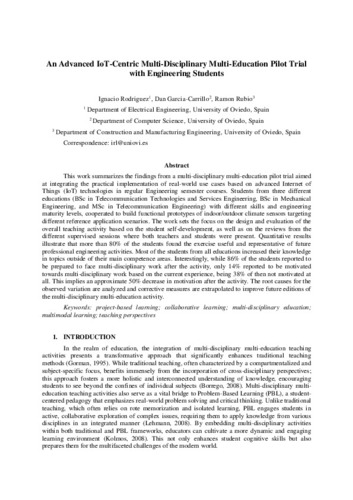An Advanced IoT-Centric Multi-Disciplinary Multi-Education Pilot Trial with Engineering Students
Autor(es) y otros:
Fecha de publicación:
Editorial:
Servicio de Publicaciones de la Universidad de Oviedo
Citación:
Descripción física:
Resumen:
This work summarizes the findings from a multi-disciplinary multi-education pilot trial aimed at integrating the practical implementation of real-world use cases based on advanced Internet of Things (IoT) technologies in regular Engineering semester courses. Students from three different educations (BSc in Telecommunication Technologies and Services Engineering, BSc in Mechanical Engineering, and MSc in Telecommunication Engineering) with different skills and engineering maturity levels, cooperated to build functional prototypes of indoor/outdoor climate sensors targeting different reference application scenarios. The work sets the focus on the design and evaluation of the overall teaching activity based on the student self-development, as well as on the reviews from the different supervised sessions where both teachers and students were present. Quantitative results illustrate that more than 80% of the students found the exercise useful and representative of future professional engineering activities. Most of the students from all educations increased their knowledge in topics outside of their main competence areas. Interestingly, while 86% of the students reported to be prepared to face multi-disciplinary work after the activity, only 14% reported to be motivated towards multi-disciplinary work based on the current experience, being 38% of then not motivated at all. This implies an approximate 50% decrease in motivation after the activity. The root causes for the observed variation are analyzed and corrective measures are extrapolated to improve future editions of the multi-disciplinary multi-education activity.
This work summarizes the findings from a multi-disciplinary multi-education pilot trial aimed at integrating the practical implementation of real-world use cases based on advanced Internet of Things (IoT) technologies in regular Engineering semester courses. Students from three different educations (BSc in Telecommunication Technologies and Services Engineering, BSc in Mechanical Engineering, and MSc in Telecommunication Engineering) with different skills and engineering maturity levels, cooperated to build functional prototypes of indoor/outdoor climate sensors targeting different reference application scenarios. The work sets the focus on the design and evaluation of the overall teaching activity based on the student self-development, as well as on the reviews from the different supervised sessions where both teachers and students were present. Quantitative results illustrate that more than 80% of the students found the exercise useful and representative of future professional engineering activities. Most of the students from all educations increased their knowledge in topics outside of their main competence areas. Interestingly, while 86% of the students reported to be prepared to face multi-disciplinary work after the activity, only 14% reported to be motivated towards multi-disciplinary work based on the current experience, being 38% of then not motivated at all. This implies an approximate 50% decrease in motivation after the activity. The root causes for the observed variation are analyzed and corrective measures are extrapolated to improve future editions of the multi-disciplinary multi-education activity.
ISBN:
Enlace a recurso relacionado:
Colecciones
Ficheros en el ítem





